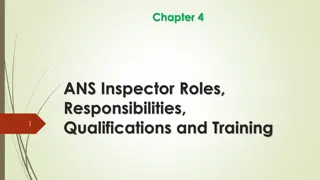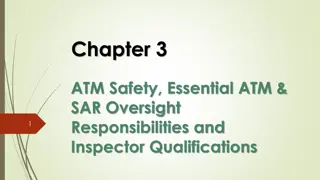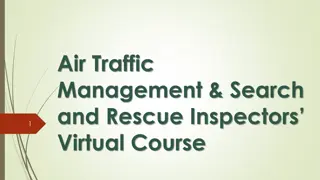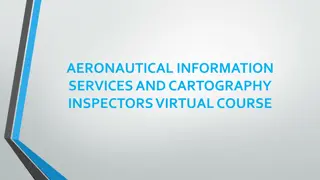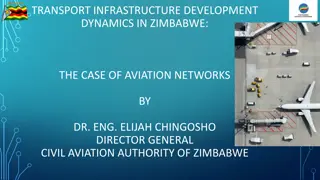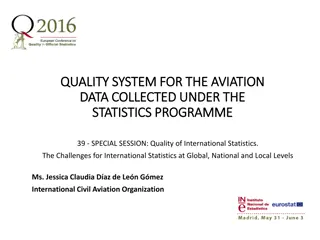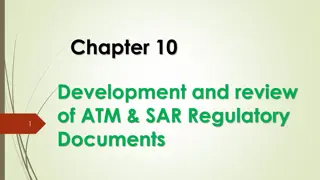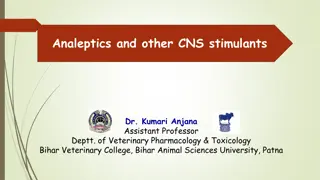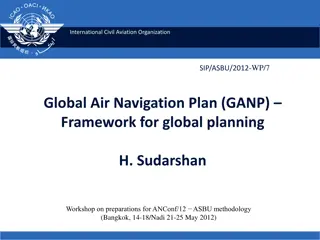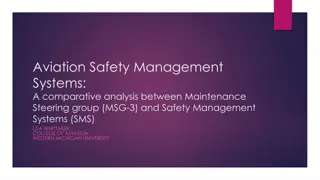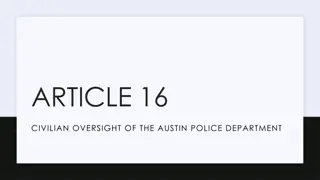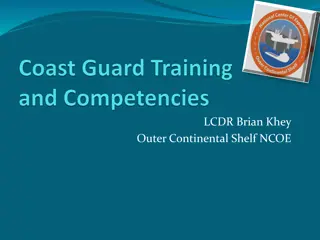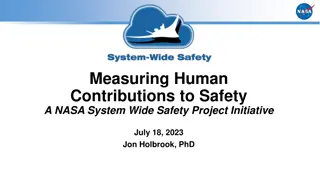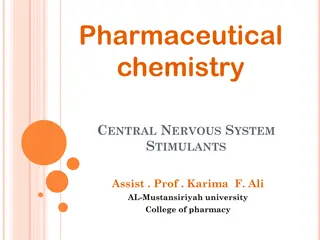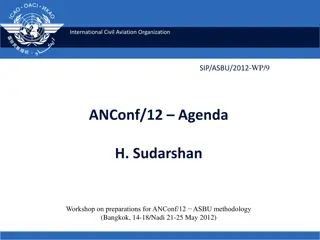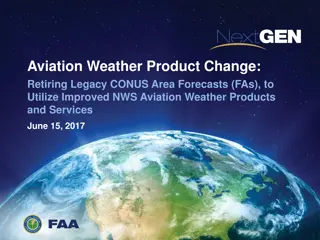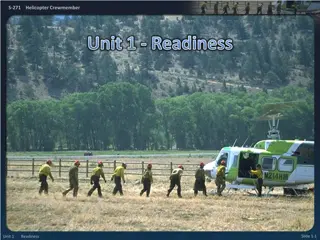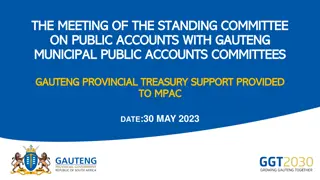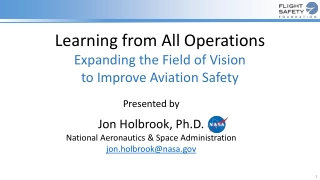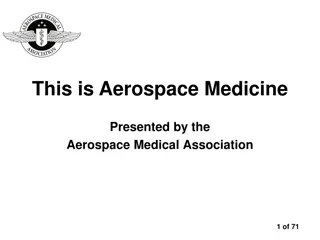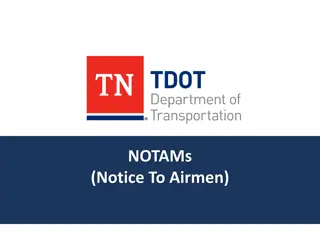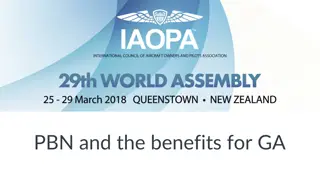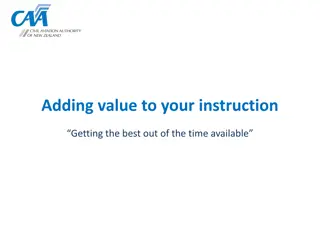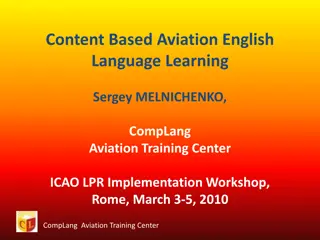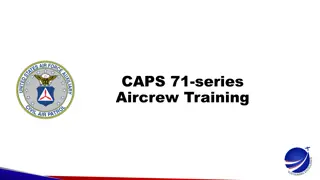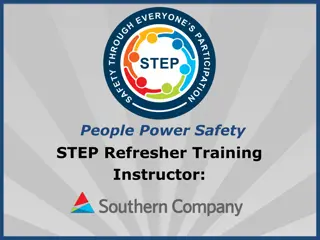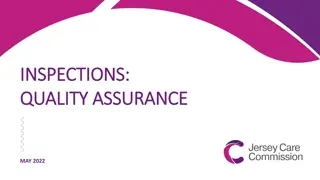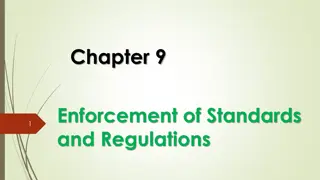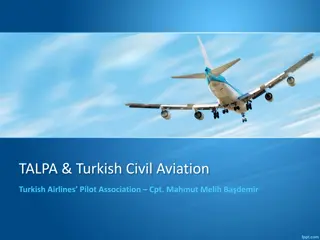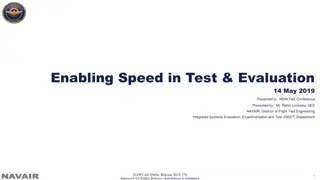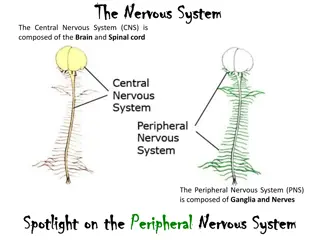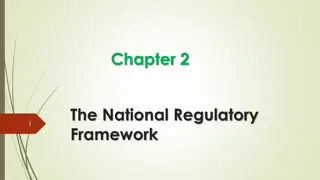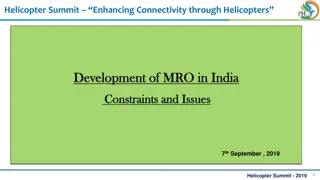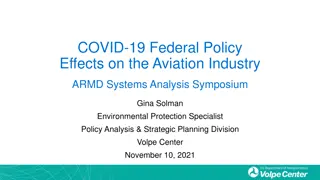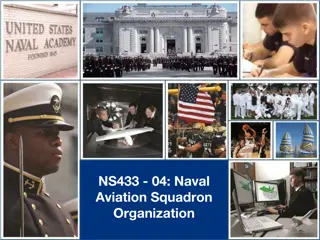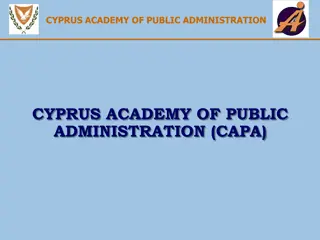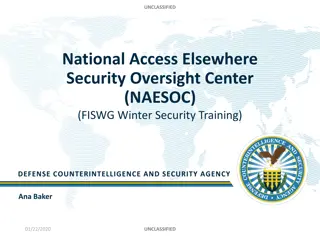CNS Inspectors Training and Responsibilities in Civil Aviation Safety Oversight
In this chapter, the focus is on the training, qualifications, duties, and responsibilities of CNS inspectors in civil aviation safety oversight. It covers the importance of education and training, ICAO guidance on training, and the role of Civil Aviation Safety Inspectors (CASI) as qualified individuals authorized by the State for safety oversight activities. The content emphasizes the need for technical expertise and competence in overseeing CNS providers.
Download Presentation

Please find below an Image/Link to download the presentation.
The content on the website is provided AS IS for your information and personal use only. It may not be sold, licensed, or shared on other websites without obtaining consent from the author. Download presentation by click this link. If you encounter any issues during the download, it is possible that the publisher has removed the file from their server.
E N D
Presentation Transcript
CHAPTER 7 CNS Inspectors Training, Qualifications, Duties and Responsibilities
Definitions Education-The act of giving intellectual, moral and social instruction as a formal and prolonged process or to train and instruct for a particular purpose Training-The act or process of teaching or learning a skill, discipline, etc., and (as an extension) practising it until the required standard is reached
ICAO Guidance on Training ICAO supports Member States and the aviation community to ensure that they have access to a sufficient number of qualified and competent personnel to operate, manage and maintain the current and future air transport system at prescribed international standards. ICAO encourages and advises governments and operators of training facilities/opportunities Aviation training is undertaken by ICAO when it is determined that it is necessary to support Member States in the implementation of SARPs, Procedures for Air Navigation Services (PANS), air transport policies and guidance and the rectification of identified deficiencies or another ICAO activity.
ICAO Guidance on Training States must determine its own staff training policy and minimum qualifications Job descriptions and demands will differ from CAA to CAA and from State to State Educational standards vary worldwide Aviation expertise in the State may be limited Government policies Staff retention policy CAAs fund initial and recurrent training
ICAO Guidance on Training Training to include; technical, seminars, workshops, report writing, management, regulations, duties, procedures, etc.
Civil Aviation Safety Inspector(CASI) -CNS Inspector Civil aviation safety inspector (CASI)-A qualified person authorized by the State to carry out safety oversight activities for civil aviation. technical specialists traditionally recruited from those sectors of the aviation industry that they will eventually oversee, and who possess the appropriate technical qualifications and competencies
Civil Aviation Safety Inspector(CASI) -CNS Inspector A CNS inspector is a qualified person authorized by the State to carry out safety oversight activities over CNS providers. Safety oversight is a function performed by a State to ensure that individuals and organizations performing an aviation activity comply with safety-related national laws and regulations. To effectively fulfil its oversight responsibilities, a State civil aviation system needs to be: properly organized, and; staffed with qualified personnel capable of accomplishing the required wide range of technical duties involved in safety oversight.
Civil Aviation Safety Inspector(CASI) -CNS Inspector The State delegates specific powers of authority to Inspectors to support the accomplishment of their tasks. Some States have included the power of authority and degree of accountability into aviation law to enable auditors and inspectors to effectively carry out their assignments. It is also necessary that States create favorable conditions that allow oversight inspectors and auditors to discharge their duties. These include: a) Establishment of clear and comprehensive workplace policies and procedures; b) Provision of a safe working environment; and c) Supplying inspectors and auditors with adequate workplace resources.
Civil Aviation Safety Inspector(CASI) -CNS Inspector CNS Inspectors Qualification Criteria; States define qualification criteria for their CNS auditors/inspectors so as to ensure an appropriate level of knowledge, training, experience and competency, covering at minimum, the following aspects: knowledge and understanding of the requirements against which audits and inspections are to be performed; techniques of examining, observing, interviewing, evaluating and reporting; skills required for managing an audit/ inspection such as planning, organizing, communicating, documenting and directing competency of auditors/inspectors that should be evaluated on a regular basis.
Basic Requirements for CNS Inspectors CNS auditors/inspectors should have a full understanding of: Relevant Standards and Recommended Practices (SARPs); Applicable State specific regulations; CNS Systems operations and maintenance; Safe operating practices
CNS Inspectors Qualification Requirements CNS Auditors/inspectors should have the necessary skills and knowledge to conduct the audits/inspections in a satisfactory manner and achieve the expected results; The auditors/inspectors should be knowledgeable on audit principles, procedures and methods (Audit Techniques); Auditors/inspectors should be able to comprehend the audit scope and apply audit criteria; Audit criteria are policies, procedures, or requirements used as a reference against which audit evidence is compared. The auditors/inspectors should be aware of, and be able to work within an organization's legal and contractual requirements; CNS Auditors/inspectors should have achieved competency through formal education, training programmes, relevant technical experience, and audit experience.
Function of CNS Oversight CNS oversight is responsible for the planning, organizing and carrying out oversight of Communications, Navigation and Surveillance (CNS) systems/services as guided by the provisions of the International Civil Aviation Organization (ICAO) convention, Annex on Aeronautical Telecommunications (covering Radio Navigation Aids, Communication Procedures, Communication Systems, Surveillance and Collision Avoidance Systems and Radio Frequency Spectrum Utilizations), the Civil Aviation Act (Primary legislation) and applicable state regulations and standards to enable achievement of the required compliance, enhance air safety and attain efficiency of the air transport sector.
Roles of CNS Inspectorate The CNS Inspectorate supports the State in achieving its oversight mandate. Essential safety oversight roles of a CNS oversight inspectorate include: Establishing State safety standards of CNS operations/services; Monitoring compliance with safety standards through routine and objective auditing and inspection CNS providers, including their functions, facilities, personnel etc Putting systems in place to license/certify/approve/rate CNS personnel (as applicable); Establishing, inspecting, and periodically renewing all CNS licenses, certifications, approvals, and ratings (as applicable)
Roles of CNS Inspectorate Monitoring the CNS service providers corrective actions and continuous safety improvement; Providing On-job training to CNS oversight organization technical personnel; Certificating ANSPs (as applicable).
CNS Inspector Duties and Responsibilities Inspectors duties will keep evolving in order to adapt to the changing regulatory environment and the specific needs of their oversight organization. As a consequence, it is not possible to identify a standardized list of tasks for CNS inspectors applicable to all States as these are specific to the structure and the context of the oversight organization in individual States. The principal operational duties of CNS inspectors will normally be focused on inspection, certification and on- going surveillance.
Duties of an CNS Inspector A CNS inspector s essential responsibility is to perform oversight of CNS providers compliance with: Applicable regulations, Standards, Procedures. For a CNS Safety Inspector, typical duties may include one or more of the following:
General Duties of an CNS Inspector Undertaking inspections, audits services/systems to ensure continued compliance with applicable ICAO standards, procedures and state regulations; and surveillance of CNS Planning and organizing the conduct of audits, inspection and surveillance of CNS systems; Developing, regulations and procedures for CNS operations; implementing and reviewing policies, standards, Conducting development and review of regulations and other related matters undergoes the requisite public participation. stakeholder engagements to ensure that the Recommending enforcement action for non-compliance with the National legislations and regulations in as far as CNS operations are concerned;
General Duties of an CNS Inspector Preparing and reviewing CNS inspections and surveillance reports giving recommendations for areas of improvement; Inspecting/auditing flight calibration procedures, processes and results to ensure compliance with regulatory requirements; Assessing decommissioning, re-allocation and modification/upgrade of CNS systems and equipment; and recommending for approval the installation, Preparing Corrective Action Requests (CARs) for non-conformances raised against CNS providers and making a follow-up for their implementation;
General Duties of an CNS Inspector Conducting training and On-Job-Training for CNS Inspectors; Undertaking the tracking and resolution of safety issues by the service provider following the conduct of inspections and audits; Reviewing CNS providers operational and technical documentation and recommending for the approval or acceptance of the same; Contributing to the development/review of regional and International standards and recommended practices related to but not limited to Aeronautical Telecommunications (covering Radio Navigation Aids, Communication Procedures, Communication Systems, Surveillance and Collision Avoidance Systems and Radio Frequency Spectrum Utilizations and the associated documents and /or publications;
General Duties of an CNS Inspector Undertaking the active participation and implementation of all ICAO USOAP activities in the areas of CNS to ensure compliance with ICAO Standards and Recommended Practices (SARPs); and Processing applications for certification of ANSP in relation to CNS facilities Analyzing ICAO State letters and recommend appropriate action
Responsibilities of CNS Inspectors In summary, CNS inspectors: Carry out efficient and effective safety oversight activities of CNS with the objective of: enhancing safety, efficiency and regularity of air navigation and; ensuring compliance with Civil Aviation Regulations and Standards; Develop technical guidance materials to enable effective implementation of Civil Aviation Regulations and technical guidance materials; .
Responsibilities of CNS Inspectors Recommend changes to civil aviation legislation and regulations as may be appropriate. Recommend enforcement action with regard to non- compliances to provisions of ICAO standards and procedures, legislation and state regulations the failure of which may endanger safety of air operations and property
CNS Inspector Training and Competencies International aviation standards require that the CAA provides its safety inspectors with comprehensive training to ensure that they are adequately qualified to perform their duties. The training objective is to provide the CNS Inspectors with knowledge and skill to enable them perform CNS regulatory functions. This knowledge is acquired through a combination of: 1) formal training courses, and; 2) on-the-job training.
CNS Inspector Training and Competencies To ensure that technical personnel receive the required training in an effective manner and maintain their competency, The State should; 1) Establish a robust training system, and; 2) Implement the system and its programs. This system should be based on a documented training and development policy established and signed at the management level of the State authorities. A CAA training policy should clearly address the initial training of inspectors, as well as the periodic recurrent and specialized training necessary for the inspectors to perform the tasks for which they are responsible.
CNS Inspector Training and Competencies The training policy should commit to provide all necessary training to all regulatory technical personnel in all areas, including: Indoctrination; initial training (e.g. induction and basic training); on-the-job training (OJT); recurrent training; and, specialized or advanced training.
CNS Inspector Training and Competencies The training policy should provide for development of a training programme for CNS safety inspectors so as to meet the requirements of CE 4 of an effective safety oversight system. In the training programme, subjects of regulatory functions and specialized areas should be meshed in order to provide overall skill and knowledge to the inspectors so as to meet the intent of the following objectives:- Instilling knowledge and ethics regarding the overall functioning of the oversight organization and the regulatory framework. Familiarizing CNS inspectors with authenticated knowledge, procedures and practices required at various level of functioning. Bringing the knowledge and understanding of inspectors into a common standard.
CNS Inspector Training and Competencies Enabling the inspectors to take various decisions in their area of work. Empowering the safety inspectors with international best practices followed by other regulatory authorities. Providing guidance for technical documentation and record keeping. Orientating the inspectors towards their functioning in their specific oversight area. Optimizing resources and management of work. Developing skill and confidence through a structured On-Job Training (OJT) so as to enable the inspectors work independently and in teams. Improving the overall personality of inspectors. Handout 7.1 Training programme
CNS Inspector Training and Competencies The training policy should also provide for the establishment of: a training programme for each technical staff position and; training plans for each technical staff member. As a principle, a CNS inspector can only be authorized to perform safety oversight duties in the area or subject where; the inspector/auditor has satisfactorily completed the required training and; maintains the required competence. Handout 7.2 Training plan
CNS Inspector Training and Competencies Training of the State s technical personnel is not limited to strictly professional elements, such as the maintenance of competency and currency only but should include a wide range of relevant topics. It is essential that civil aviation inspectors also be provided with training on other subjects such as; applicable CAA regulations, inspectors skills, knowledge, duties and responsibilities, and; CAA procedures for the implementation and enforcement of requirements.
CNS Inspector Training and Competencies 1. Initial training The basic component of initial training should address the following topics: departmental ethics/conduct and discipline; security aspects of the safety inspector s work; the role of safety oversight inspectors, their codified level of authority and degree of responsibility; overview of CAA-regulated entities and associated challenges; basics of human factors;
CNS Inspector Training and Competencies 1. Initial Training Cont certification and authorization policies, processes and procedures; surveillance and inspection policies, processes and procedures; audit policies, processes, and procedures; investigations and enforcement policies, processes and procedures; risk assessments; State safety programme (SSP); safety management systems (SMS); Quality assurance
CNS Inspector Training and Competencies 2. Specialized Training The purpose of specialized training is to upgrade the knowledge and competency of inspectors to be at par with international standards and for efficient functioning. During specialization training, CNS inspector candidates apply the knowledge and skills acquired during the basic phase. Often this can best be accomplished by introducing realistic, but hypothetical, scenario-based exercises
CNS Inspector Training and Competencies 2. Specialized Training Cont. Example of specialized training CNS inspector candidates could demonstrate the knowledge and skills required to perform one or a combination of the following duties and tasks: review and approve manuals; review training programmes; Review maintenance programmes conduct an inspection; During specialization training, the instructor should assess if the trainees demonstrate all the competencies at the level determined by the CAA.
CNS Inspector Training and Competencies 3. Recurrent training To ensure that CNS inspectors maintain competency, proficiency and keep current on latest techniques, procedures and new developments in their respective areas of expertise, it is essential that they receive periodic recurrent training. 4. Training for re-qualification An Inspector who has been out of the programme for a period specified by the State: a) Shall undertake a recurrent training, and b) Conduct at least two inspections accompanied by a lead Inspector
CNS Inspector Training and Competencies 5. Advanced Training The goal of advanced training is to enhance the competencies of experienced inspectors so they can effectively address challenging and complex oversight issues. Training in the following areas can support the acquisition of competencies that inspectors should demonstrate as senior inspectors: programme management; organizational cultures and change management; quality management system implementation and audit techniques; dispute resolution; root cause analysis; corrective and preventive action plans; and conducting investigations and enforcement procedures.
CNS Inspector Training and Competencies On-job Training Technical personnel should satisfactorily complete OJT before being assigned safety oversight-related tasks and responsibilities. OJT for CNS inspectors should; 1) be provided by experienced, senior CNS inspector as appropriate; and, 2) follow a structured program that includes observing as the qualified inspector carries out oversight activities, working under supervision, competence assessment and authorization
CNS Inspector Training and Competencies On-job Training Cont. It is important to ensure that CNS auditors/inspectors are only authorized to perform tasks after having been assessed as qualified. The completion of the OJT, including the competency assessment, should be properly documented. The CAA shall keep and maintain all the training records of all Inspectors.
CNS Inspector Training and Competencies On-job Training Cont. All CNS Inspector/auditor candidates shall undergo OJT under the supervision of a qualified ANS Inspector. The candidate must, a) first participate in the number of inspections specified in the training program while observing a qualified ANS Inspector conduct the audits; and, b) personally conduct the number of inspections specified in the training program under the supervision of an experienced and credentialed ANS-CNS Inspector.
Continued Inspector Qualifications After completion of on-the job training, CNS inspectors will be issued with a certificate/credential which authorizes them to perform oversight activities. In order to receive and maintain CNS inspector certificate/license, the inspector must: Satisfactorily complete initial and recurrent training; Complete on-the job training; and Participate in the number of audits/inspections determined by the State over a specified period of time (Remain current in practice).
CNS Inspectors Attributes Ethical conduct: The inspector must be professional The Inspectors should possess a high degree of integrity, be impartial in carrying out their tasks, tactful and able to relate with people. Good management, communication and interpersonal skills. Avoid personal prejudices Manage cross-cultural differences effectively Overcome recent-action bias Avoid using personal opinion in arriving at audit conclusions
Inspector Competencies The oversight inspector competencies are used to reliably predict successful performance of inspectors in the performance of their duties and tasks. This is especially useful as inspectors need to adapt to a changing regulatory environment. Over the course of their careers, inspectors will find themselves in unusual and frequently complex situations. Depending upon the circumstances, they can be called upon to act as observers, analysts, investigators, auditors, mediators, negotiators, technical experts, judges or even as witnesses. Technical expertise alone does not prepare a person to function competently in such an environment.
The ICAO Inspector Competency Framework For these reasons, ICAO promotes a competency framework for safety oversight inspectors. The ICAO competency frameworks are developed by ICAO and present a set of competencies for a given aviation discipline. Each competency has an associated description and observable behaviours. It is a generic blueprint to guide the development and maintenance of a strong inspectorate workforce. The ICAO Civil Aviation Safety Inspectors competency framework should be adapted by States to the context of the oversight organization in which the inspectors work. Ref. Doc. 10070 - Manual on the Competencies of Civil Aviation Safety Inspectors chapter 3.3.
Inspector Credentials The CNS Inspector s credentials will identify the bearer as an accredited representative of the Authority authorized to perform inspections/audits and discharge those duties as provided for by the CAA. Approval Authority The CAA accounting officer is the approving authority for issuance of Inspector credentials. Responsibility The CAA is responsible for establishing the criteria for eligibility, issuance and accountability of all Inspector credentials and the procedures for issuance and control of credentials.
Inspector Credentials Use of Credentials a) The credentials shall be used only in the conduct of official business b) Holders of credentials are responsible for their proper safekeeping at all times c) Misuse or improper possession of the credentials can subject the offender to disciplinary action.
Loss of credentials and Surrender of Credentials Loss of credentials The CNS Inspector s credential is the property of the Authority. Loss of credentials should be reported to relevant security authorities immediately. Surrender of Credentials The CNS Inspector s credentials shall be surrendered to the holder s supervisor under any of the following conditions: a) Termination of employment; b) Reassignment to a position which does not require an CNS Inspector s credential; c) Issuance of a revised credential; d) Upon demand of the issuing authority; or e) Expiry of the validity period of the credential.
END END


